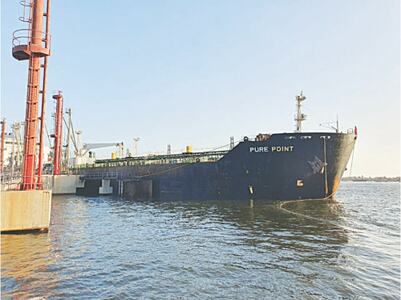Foreign Minister Bilawal Bhutto-Zardari called on Thursday for the restoration of the Black Sea grain initiative, saying he would be reaching out to United Nations Secretary General Antonio Guterres and to his counterparts in Turkiye and Russia on the matter.
“It is not only in our interest but in the world’s interest that this grain initiative is restored,” he said at a press conference, speaking alongside his Ukrainian counterpart, Dmytro Kuleba, in Islamabad.
The deal allowing the safe Black Sea export of Ukraine’s grain expired on Monday after Russia quit and warned it could not guarantee the safety of ships.
According to Guterres, millions of people facing hunger will “pay the price” of Russia’s decision to exit the Ukraine grain deal and the move will “strike a blow to people in need everywhere”.
Highlighting the same, Kuleba also emphasised the need for the deal’s restoration.
The Ukrainian foreign minister arrived in Islamabad earlier today for a two-day visit. He is on the first ministerial visit to Islamabad from Kyiv since the establishment of diplomatic ties in 1993.
The visit comes at a time of warming ties between Islamabad and Moscow, with Pakistan beginning oil imports from Russia earlier this year.
In his speech at the press briefing, Kuleba maintained that Russia had undermined world food security.
“We had to find the way to export our grain to the global market,” said Kuleba, adding, “land corridors cannot export the full amount of cereals available for export, this is the issue, which means prices will go up because of shortages of delivery.”
Kuleba said the sea was the best route to get grains and staples to the world market, which has seen a spike in commodity prices since Russia’s invasion of Ukraine last year.
The UN estimates the grain deal lowered food prices globally by 20 per cent.
“This is why it is so important to make everything possible to restore the Black Sea grain initiative — to return balance to the global food market, to return prices under control, to give Ukraine the possibility to provide grains to the countries that need it the most,” Kuleba said.
‘No defence supplies to Ukraine’
In response to a question, Bilawal also rejected “unfounded” media reports of Pakistan providing military supplies to Ukraine.
Since the beginning of the war, he said, “we have not concluded any agreement for defence supplies to Ukraine, keeping in view our principled, consistent and non-partisan stance”.
The Ukrainian FM also confirmed this.
Peaceful resolution of conflicts stressed
Both foreign ministers said they discussed economic cooperation, with a focus on specific arrangements regarding food security.
According to a statement issued by the Foreign Office (FO), Bilawal said in his opening remarks at the press briefing that he and Kuleba had concluded comprehensive discussions covering the entire range of bilateral relations and regional and multilateral issues of importance.
“Pakistan enjoys longstanding friendly ties with Ukraine. Pakistan-Ukraine relationship has a long history and has covered trade and investment, agricultural and defence cooperation, cultural exchanges and deep people-to-people contacts.
“We wish to further expand cooperation to all areas of mutual benefit,” he added.
In this connection, Bilawal said building trade and economic ties was a priority area for Pakistan and “we aspire to build a mutually beneficial relationship that contributes to the prosperity and well-being of our nations”.
“In our meeting today, we agreed on the importance of regular dialogue and engagement to further strengthen our bilateral ties. We have also agreed to hold meetings of various institutional mechanisms in due course. We will continue to build on our conversation to add more substance to our relations,” he told reporters.
The minister said he and Kuleba also discussed the situation in Ukraine.
“I shared with the foreign minister our deep concern at the prevailing situation and offered our condolences on the loss of precious lives and immense human suffering.
In a gesture of solidarity with the people of Ukraine and despite our own economic challenges, we have sent humanitarian assistance.“
Bilawal further said Pakistan believed that “prolonged conflict brings immense hardship and suffering to the civilian populations”.
“We hope, therefore, that peace will prevail so that the people of Ukraine and Russia can enjoy peace dividends,” he said, adding, “In our meeting, I emphasised the importance of peaceful resolution of disputes and conflicts through dialogue and engagement and Pakistan’s readiness to support peace initiatives which can bring peace to the region.”
“As a country in a volatile region, we understand how longstanding regional conflicts can endanger our collective security.”
Bilawal highlighted that the Ukraine conflict had also brought difficulties for developing countries and the global south, particularly in terms of fuel, food and fertilisers shortages.
“Pakistan is no exception. We, therefore, have a vested interest in promoting peace and reconciliation. We hope for a peaceful resolution of the conflict through dialogue and diplomacy,” he said.
The minister also appreciated the Ukrainian government for its “principled stance in supporting the resolution on countering religious hatred constituting incitement to discrimination, hostility or violence at the Human Rights Council in Geneva on July 12”.
“As we look to the future, I am confident in our joint efforts to strengthen our bilateral relationship. We resolve to move forward in fostering cooperation and friendship between the peoples of Pakistan and Ukraine,” he said, concluding his address.














































